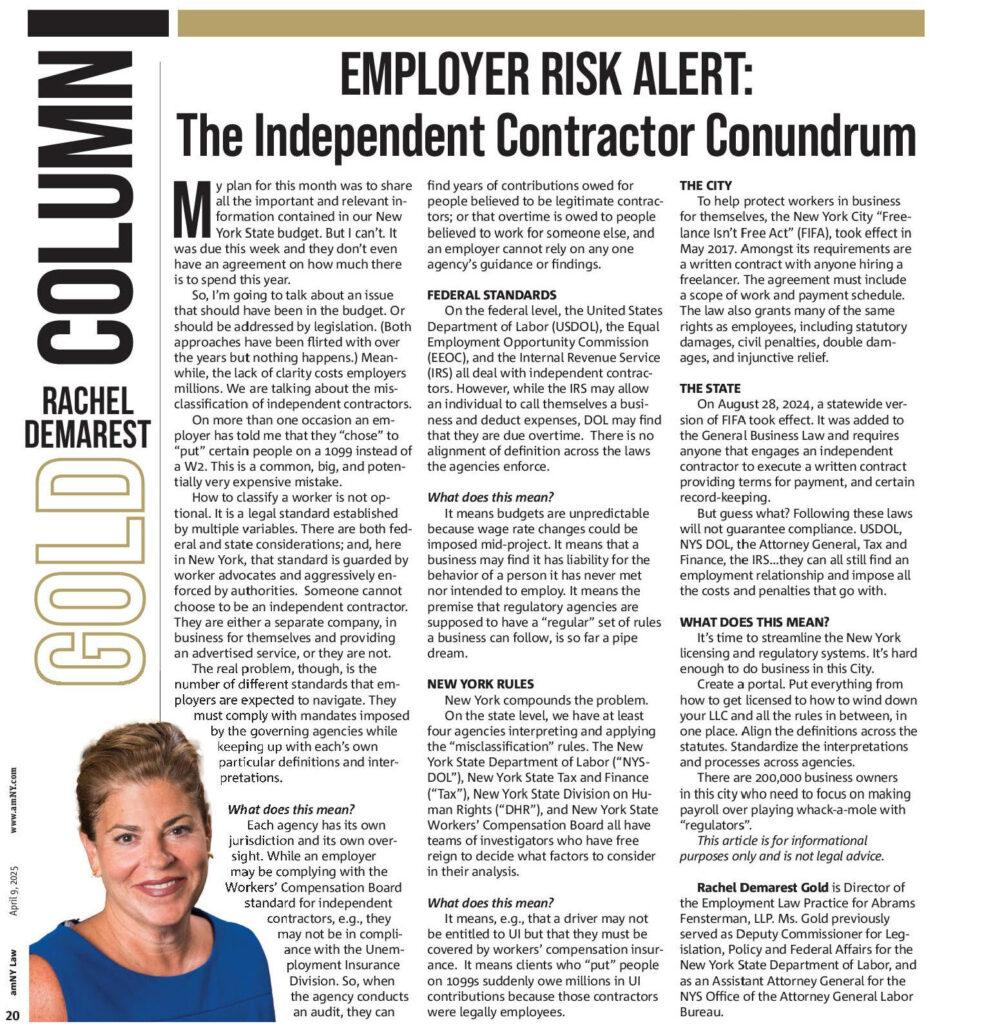By Sharon P. Stiller
Scenario 1:
Having washed out of films, Lindsay applies to become Don’s new assistant (Don is notorious within advertising for his checkered history of ex-assistants). Lindsay gets the job and manages to meet the requirements for awhile.
Lindsay begins to show up to work late. This pattern worsens, as Lindsay frequently disappears without anyone knowing her whereabouts.
Due to Lindsay’s much publicized bouts of drug abuse and treatment, Don knew of Lindsay’s issues. In fact, Lindsay had “tweeted” about dealing with her addiction. Don’s attorneys told him that he could not refuse to hire Lindsay because she had a history of substance abuse. Don does not want to run afoul of any disability laws. Don wonders whether he can ask Lindsay if her absences are caused by a relapse. What should he do?
Is the Substance Abuser Protected under Federal and State Disability Laws?
The federal Americans with Disabilities Act (ADA) prohibits covered employers from discriminating against a qualified individual with a disability in most aspects of the employment relationship. 1 To be considered disabled under the ADA, an individual must (1) have a physical or mental impairment that substantially limits one or more major life activities, (2) a record of such impairment, or (3) be regarded as having such an impairment. 2
That an employee is a drug addict or alcoholic does not mean the employee is automatically considered disabled. The addiction must substantially limit one or more major life activities. 3 Further, the ADA provides that an employee currently engaged in illegal drug use is not considered disabled when an employer takes action against the employee on the basis of that drug use. 4 Because drug testing is not considered to be medical testing, disclosing that a terminated employee failed a drug test is not disability-related harassment. 5
Beyond the ADA, there are other federal and state statutes that impact substance abusers and testing in the workplace. Section 504 of the Rehabilitation Act of 1973, the New York Human Rights Law (the “State HRL”) and the New York City Human Rights Law (the “City HRL”) all prohibit employer discrimination based on disability. 6 In general, all three statutes are interpreted similarly to the ADA. 7 Some of the subtle differences, however, can be vitally important. 8 For example, both the Second Circuit and the New York Court of Appeals have recognized that the term “disability” is broader under the State HRL. 9 Therefore, a substance abuser can be disabled under the State HRL “if his or her impairment is demonstrable by medically accepted techniques; it is not required that the impairment substantially limit that individual’s normal activities.” 10
Even assuming a substance abuser is deemed disabled, the employer can still hold the employee to the same standards as other employees. 11 For example, an alcoholic who is chronically late to work can be fired for tardiness, even if the lateness stems from the disease. 12
This last point brings us back to our hypothetical. Don’s attorneys were correct that he could not refuse to hire Lindsay because she is a former substance abuser. However, there is nothing illegal about insisting that Lindsay meet the attendance requirements of her position. If Lindsay admits that her attendance problems were caused by current drug use, Don may terminate her because the ADA and other disability laws do not protect current drug users. But, if Lindsay claims she is rehabilitating and needs some time off to attend treatment, Don must accommodate the reasonable request if Lindsay will be able to perform her job with the accommodation.
Drug and Alcohol Testing: Is it Mandatory, Permissible or Even Helpful?
Scenario 2:
When Lindsay tells Don she needs a reasonable accommodation to allow her treatment to continue, Don is skeptical and wonders if he can require Lindsay to take a drug test to prove she is no longer using. Don’s firm does not have a drug testing policy.
The ADA explicitly states that it is not to be interpreted to encourage, prohibit or authorize drug tests by employers. 13 It is therefore generally permissible for an employer to drug test both prospective and current employees and to take disciplinary action against an employee who fails her drug test.
The rules for alcohol testing are slightly different than those for drug testing. Testing for the presence of alcohol is considered as a medical test under the ADA. 14 Therefore, before an employment offer is made, employers cannot test prospective employees for alcohol. 15 Post-offer, the ADA prohibits the medical testing of employees unless the testing is shown to be job-related and consistent with business necessity. 16
Interestingly, the Second Circuit has held that the ADA is not violated by testing an employee with a history of substance abuse more frequently than an employee with no such history. In Buckley v. Consolidated Edison Co. of N.Y., Buckley was identified as a substance abuser and was required to submit to random drug and alcohol testing approximately once every 25 days. 17 Buckley suffered from a condition colloquially referred to as “shy bladder syndrome,” causing an inability to urinate, particularly in public or on command. Buckley was unable to produce a urine sample in the time allotted by his employer, and was terminated.
The Second Circuit found that the plain text of the ADA allows the more frequent testing of substance abusers.
The plaintiff in Buckley did not contend that shy bladder syndrome itself was a disability, and the courts have divided about the issue. A Tennessee federal district court held that it was premature to decide on the pleadings whether shy bladder syndrome is a disability under the ADA. 18 However, in granting summary judgment for the defendant, a Wisconsin federal district court found that shy bladder syndrome was not a disability 19
In 2008, Congress expanded the definition of “major life activities” by listing “the operation of a major bodily function, including but not limited to functions of the … bladder.” 20 Given this new definition, a plaintiff could argue that shy bladder syndrome substantially limits the functioning of the bladder within the meaning of the ADA, therefore warranting reasonable accommodation.
Dealing with Substance Abusers in the Workplace
The first step toward effectively dealing with substance abusers in the workplace is to draft a policy providing that any employee currently using, possessing or under the influence of illegal drugs or alcohol at work is subject to discipline. In most situations, problems caused by substance abuse can be addressed through focusing on performance and performance reviews, without ascertaining the root cause of the poor performance. By dealing only with employee conduct, the employer avoids concerns about improperly labeling an employee as disabled or about failure to accommodate.
Employers may also consider implementing a universally enforced drug and/or alcohol testing policy. There is no legal requirement or prohibition on workplace drug or alcohol testing in New York. Due to the expense and employee-perceived intrusion associated with workplace drug or alcohol testing, adopting a testing policy may be unnecessary, except for regulated industries (e.g., trucking), certification purposes or in safety-sensitive industries.
Where employee mistakes caused by substance abuse present dangerous situations for the employee and/or co-workers, it is cost-effective and has a deterrent impact to implement a carefully crafted testing policy. Such a policy may require testing randomly, after any workplace accident or when a supervisor reasonably believes an employee is under the influence during work hours. The testing policy should be communicated to all employees, and each employee should execute an acknowledgment of receipt.
A drug or alcohol testing policy should not require an employee’s termination upon testing positive. An employer does not want to be in a position where a star employee must be terminated as a result of an isolated positive test. Also, any testing policy must specify that a negative test does not preclude disciplining under other policies (e.g., the employee conduct policy). This language avoids the implication that an employee involved in an industrial accident, and who has a history of such accidents, will keep the job if test results are negative.
We stress that any conduct or substance policy must exist not only in form but in daily practice. Any uneven or selective enforcement of a substance abuse policy can subject the employer to a disparate treatment claim. As stated above, the Second Circuit has sanctioned testing substance abusers (even those not currently using substances) more frequently than non-substance abusers, but an employer’s testing policy should make clear that the employer reserves that right.
Closing the loop on the saga of Don and Lindsay, we suggest that Don warn Lindsay about her performance, and inform her that continued unexcused absences will result in termination. If Lindsay asks for time off for rehabilitation, it should be granted. 21 We would not recommend that Don ask Lindsay to submit to a drug test, especially without a testing policy. Lindsay’s absenteeism can be addressed through Don’s employee conduct policy without resort to drug testing.
Sharon P. Stiller is a partner at Abrams Fensterman, LLP and is the Director of the firm’s Employment Law practice. Abrams Fensterman, LLP is a full service law firm serving clients throughout New York, New Jersey and Florida.
1See 42 U.S.C. § 12112(a), 12111(5)(A) (defining “employer”).
242 U.S.C. § 12102(1).
3Reg’l Econ. Cmty. Action Program, Inc. v. City of Middletown, 294 F.3d 35, 47 (2d Cir. 2002); Skinner v. City of Amsterdam, — F.Supp.2d –, 2010 WL 1223032, at *6 (S.D.N.Y. Mar. 30, 2010). See also EEOC v. J.B. Hunt Transport, Inc., 321 F.3d 69, 75-78 (2d Cir. 2003) (no ADA violation where trucking company refused to hire individuals taking prescription drugs that could impair driving ability because the company only viewed these individuals as being unfit for a specific job rather than a broad classification of jobs).
442 U.S.C. § 12114(a).
5Skinner, 2010 WL 1223032, at *14.
629 U.S.C. § 794(a); N.Y. Executive Law §296(1)(a); N.Y.C. Admin. Code § 8-107(1)(a).
7Henrietta D. v. Bloomberg, 331 F.3d 261, 272 (2d Cir. 2003) (the ADA and the Rehabilitation Act will be applied similarly unless a statute’s specific terms dictate differently); Robertson v. Amtrak/Nat’l R.R. Passenger Corp., 400 F.Supp.2d 612, 623 (S.D.N.Y. 2005) (disability claims brought pursuant to the Rehabilitation Act, the State HRL and the City HRL are construed similarly to ADA claims); State Div. of Human Rights v. Xerox Corp., 65 N.Y.2d 213, 218-19, 491 N.Y.S.2d 106, 109 (1985).
8See 29 U.S.C. § 794(a) (Rehabilitation Act only applicable to employers receiving federal funding); Exec. Law §292(5) (defining an “employer” as having at least four employees); N.Y.C. Admin. Code. § 8-102(5) (same).
9Batac v. Pavarini Const. Co., Inc., 216 Fed. Appx. 58, 61 (2d Cir. 2007); Treglia v. Town of Manlius, 313 F.3d 713, 723-24 (2d Cir. 2002).
10Reeves v. Johnson Controls World Servs. Inc., 140 F.3d 144, 155 (2d Cir. 1998) (internal quotation marks omitted). See also Exec. Law § 292(21).
1142 U.S.C. § 12114(c)(4).
12Vandenbroek v. PSEG Power CT LLC, 356 Fed. Appx. 457, 460 (2d Cir. 2009) (an alcoholic with chronic attendance problems was not otherwise qualified to perform the essential functions of his job); Daddazio v. Katherine Gibbs Sch., Inc., No. 98 Civ. 6861, 1999 WL 228344, at *5 (S.D.N.Y. Apr. 20, 1999) (noting that regular attendance is an essential function of every job), aff’d 205 F.3d 1322 (2d Cir. 2000 ). But see Teahan v. Metro-North Commuter R.R. Co., 951 F.2d 511, 515-16 (2d Cir. 1991) (under the Rehabilitation Act, an employee is fired because of her disability when the decision is based on conduct caused by alcoholism). However, even in Teahan, the Second Circuit thought that an employee who frequently failed to come to work as a result of alcoholism may not be “otherwise qualified” for his job. Id. at 515, 520-21.
1342 U.S.C. § 12114(d)(2). See also 42 U.S.C. § 12114(b).
14Equal Employment Opportunity Commission, Enforcement Guidance: Disability-Related Inquiries and Medical Examinations of Employees under the Americans with Disabilities Act, at http://www.eeoc.gov/policy/docs/guidance-inquiries.html (last viewed Sept. 21, 2010).
1542 U.S.C. § 12112(d)(2)(A); Equal Employment Opportunity Commission, ADA Enforcement Guidance: Preemployment Disability-Related Questions and Medical Examinations 16, at http://www.eeoc.gov/policy/docs/medfin5.pdf (last viewed Sept. 21, 2010).
1642 U.S.C. § 12112(d)(4)(A).
17155 F.3d 150 (2d Cir. 1998).
18Melman v. Metro. Gov’t of Nashville & Davidson County, No. 3:08-cv-1205, 2009 WL 2027120, at *3 (M.D. Tenn. July 9, 2009).
19Balistreri v. Express Drug Screening, LLC, No. 04-C-0989, 2008 WL 906236, at *5 (E.D. Wis. Mar. 31, 2008).
2042 U.S.C. § 12102(2)(B).
21In addition to the disability statutes, Lindsay’s request for time off for the treatment of her drug addiction may implicate the Family and Medical Leave Act (FMLA). See 29 U.S.C. § 2612(a)(1)(D); 29 C.F.R. § 825.119(a).





